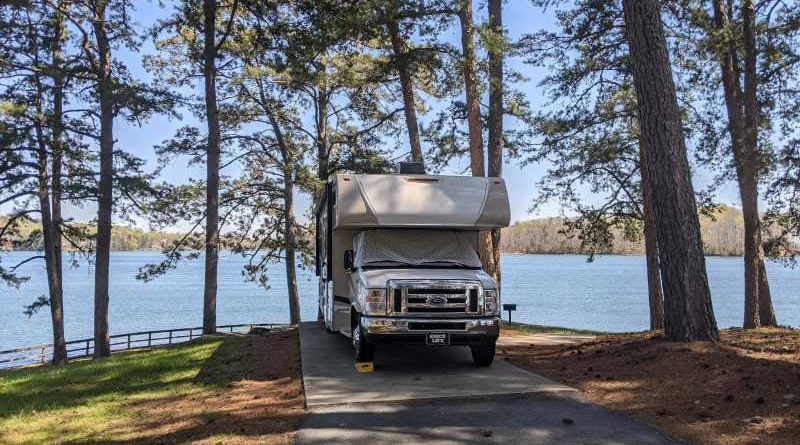9 tips for finding available RV campsites this summer
My husband and I traveled the world full-time and lived out of hotels for almost three years until the pandemic brought us back to the U.S. last spring. After realizing we wouldn’t be able to quickly return to our global digital nomad life due to border closures and ever-changing airline schedules, we bought a recreational vehicle (RV) to travel domestically.
We’ve learned a lot in our first nine months of RVing full-time. But, one ongoing task that’s been more time-consuming than I initially assumed is finding and booking available RV campsites. So, today I’ll share nine tips for finding RV campsites when availability is scarce.
Get the latest points, miles and travel news by signing up for TPG’s free daily newsletter.
In This Post
Plan ahead
We’ve purposefully kept our schedule flexible and hence rarely book campsites more than a week in advance. But, if you’re willing and able to plan, you can often snag campsites at popular locations when the booking window opens. And, for less popular areas, you may still find ample availability if you book just a month or two in advance.
For example, my husband’s aunt is planning a cross-country RV trip and plans to camp in several popular national parks. By getting online right when the booking window opened for each park, she was able to book all the sites she needs for her trip. Likewise, many of the people we met at Manatee Hammock campground on Florida’s Space Coast this winter were already booking their favorite sites for next winter.
Related: 5 things I learned from my first ‘RV resort’ stay
Check frequently
As I mentioned above, we don’t typically plan out campsites far in advance. But, I’ve been able to snag some popular campsites through one easy but time-consuming method: frequently checking for new availability. For example, I grabbed two nights at Zion National Park‘s Watchman Campground on our first RV relocation rental back in 2017 using this method. And I’ve gotten holiday weekend sites at several campgrounds since using this same technique.
Typically, I’ll check campground availability for my next stay every day to get a feel of what’s available. However, if I want a specific campground or I know availability is low in an area, I’ll start checking more frequently. Some RVers have even written scripts to automate this checking.
Related: Not just for flights: Save money on summer road trips with points and miles
Use different booking platforms
RV campgrounds use an entirely different set of booking platforms than hotels. So, it took me some time to find the best platforms for finding and booking RV campsites. But, I’ve found the following platforms and apps typically uncover most of the available RV campgrounds:
- Recreation.gov for camping on federal lands
- Reserveamerica.com for some state parks and other public campgrounds
- RV Parky for a listing of campgrounds and stores that allow overnight parking (you can’t book through this site, though)
- State park websites, if not on Reserveamerica.com
- Kampgrounds of America (KOA) as a fallback when availability is tight
- Airbnb for private sites and individuals reselling long-term sites for shorter periods
I typically start with Recreation.gov since it displays reviews and ratings for cell data (which is critical for us since we rely on Verizon data to work remotely from campgrounds). Plus, I enjoy staying at lake-side Army Corps of Engineers campgrounds, which are bookable through Recreation.gov.
Related: Why I hope buying an RV saves travel for our family
Search for campgrounds not bookable through major sites
Most RVers check the major booking sites when looking for a campground. So, campgrounds that appear on these sites tend to sell out quickest (and in the case of KOA, tend to be most expensive). But, you can often snag a spot at a campground that doesn’t appear on major sites, even during peak season.
Load Error
For example, availability can be easy to find at some state parks that use their own reservation system instead of Reserveamerica.com. And I had great luck booking sites at the beautiful Mantatee Hammock on Florida’s Space Coast last winter since the park requires you to use Brevard County’s reservation system.
RV Parky shows most campgrounds. But, it’s also worth searching on your favorite mapping software for campgrounds. Of course, you’ll find many mobile home parks intended for long-term residents. Some of these parks will accept short-term RVers, but you’ll usually need to call to check prices and availability. We’ve stayed in various mobile home parks for a few nights over the last nine months, including stays in Marrietta, GA and Orlando, FL.
Related: Why this camping loyalty program is worth its $33 fee
Expand your search area
We’ve had the most trouble finding RV campsites when we needed to be in a specific area. But, by expanding your search area, you can often snag great campsites. And, if you have a vehicle to drive that’s not your RV, staying a bit farther away from your ideal destination may only be a minor inconvenience.
Related: Why you should go for a run when you land in a new city
Check sites that aren’t quite what you want or need
Of course, sometimes you need to be in a specific location. I’ll often search for sites that aren’t quite what I want or need when availability is scarce.
For example, my husband’s family is meeting at a campground near the Great Smokey Mountains National Park this summer. Most of the family is renting cabins or glamping tents, but we decided to bring our RV. However, by the time the family settled on dates, no full-hookup RV sites were available. But, by reducing our requirements, I snagged a small campsite with only power and water that should fit our RV.
Likewise, we can typically fit into sites with a maximum vehicle length smaller than our RV. Of course, this is a risky decision as we could arrive at a campsite that’s actually too small for our vehicle. But, especially since we don’t have any other vehicles besides our RV and my husband is comfortable maneuvering our RV into tight sites, the risk is relatively low.
Related: 5 things people get wrong about traveling in a camper van
Search shorter dates
We typically like to stay at campgrounds for an entire Sunday to Sunday week. After all, this lets us move and resupply on a weekend day when we’re both off work. And it gives us a full day off in each destination to enjoy the park or relax. But, seven-night stays are often challenging to come by. So, we’ve often found success chopping a day or two off at the start or end of our desired stay.
For example, I was recently able to snag one of the premium peninsula campsites at Sawnee Campground on Lake Lanier in North Georgia by simply searching for a check-in date of one day later than I’d ideally wanted. When I need to go with slightly different dates than I’d ideally book, I use one of the following two tips for the night(s) I didn’t get.
Related: 7 mistakes every road tripper makes at least once
Move sites partway through your stay
One downside of booking RV campsites at the last minute is that it’s often difficult to secure one campsite for your entire stay. Unlike hotel rooms, you typically book a specific campsite when making a reservation. After all, each campsite offers different views, driveway lengths and, in some cases, amenities.
Unfortunately, most campground reservation systems don’t make it easy to piece together a multi-site stay. Some sites will display an availability grid. But, this grid typically isn’t easily sortable and most campgrounds have more sites than you can see on one screen. So, I often rely on dividing my stay up into two, three or four-night chunks and searching manually.
Some RVers think it is too much of a hassle to move sites partway through a stay. But, especially since we need to move our RV occasionally to dump our tanks or go grocery shopping, it doesn’t bother us much to switch sites within the same campground every couple of days.
Related: Don’t make these 5 mistakes when buying your first RV
Fall back on free camping options
Friday and Saturday nights are usually the pinch point for snagging campground reservations. And, we typically don’t book one-night stays unless we can move within the same campground. So, when we need a one-night stay, we’ll normally drive partway to our next campground and then rely on one of two free camping solutions.
The solution we’ve relied on most when we can’t find RV campsite availability is stores that allow RVers to park overnight at no cost. RV Parky allows you to filter by stores that allow overnight RV parking, including Cracker Barrel and Walmart. Some locations don’t allow overnight parking, though. So, call ahead or go inside and ask for permission before parking overnight. And, of course, purchase something with the store before leaving.
We also purchased a Harvest Hosts annual membership. This membership allows us to park overnight at participating wineries, breweries, farms and attractions for no additional cost on top of the $99 yearly membership fee. The main downside to Harvest Hosts is that you have to make a reservation with each Harvest Host before you overnight. So, it’s not ideal for last-minute overnights or drives where you want to stop when you get tired.
Related: Going on a road trip? Take these credit cards with you
Bottom line
The hassle of finding available RV campsites frequently makes me long for the simplicity of booking hotel rooms. And, on several occasions, we’ve fallen back on booking a hotel for a night when we needed unlimited internet for work. But, we’ve otherwise always found an RV campground that worked using a combination of the techniques described in this guide.
Featured image of Sawnee Campground in Cumming, GA by Katie Genter/The Points Guy.
SPONSORED: With states reopening, enjoying a meal from a restaurant no longer just means curbside pickup.
And when you do spend on dining, you should use a credit card that will maximize your rewards and potentially even score special discounts. Thanks to temporary card bonuses and changes due to coronavirus, you may even be able to score a meal at your favorite restaurant for free.
These are the best credit cards for dining out, taking out, and ordering in to maximize every meal purchase.
—
Editorial Disclaimer: Opinions expressed here are the author’s alone, not those of any bank, credit card issuer, airlines or hotel chain, and have not been reviewed, approved or otherwise endorsed by any of these entities.
Source: Read Full Article




